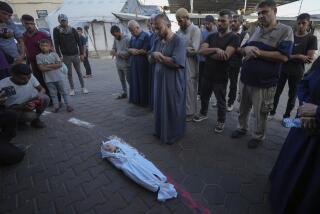Rocket attacks continue after Israel’s withdrawal from Gaza
GAZA CITY — Within hours of the Israeli army’s predawn withdrawal from the Gaza Strip on Monday, Hamas was declaring victory in its latest round of armed conflict with the Jewish state.
To punctuate its point, more than a dozen rockets were launched during the day at nearby Israeli towns. The message: The two-day Israeli tank incursion that killed more than 60 Palestinians had failed to cripple the rocket-launching capability of Gaza’s militants.
“If you are asking, ‘Did this single incursion solve the problem,’ the answer is clearly not. But we have to understand that there is no quick fix,” said Israeli government spokesman Mark Regev.
“I saw that people in Hamas said it was a victory for Hamas, and so I’d like to publicly wish them many more such victories,” he said. “I am 100% confident that this operation was successful in applying pressure on Hamas’ leadership -- pressure that hurts.”
The recent surge in violence has refocused international attention on the rocket barrages that have plagued the Israeli border town of Sderot for years and recently expanded to target the city of Ashkelon, more than 10 miles from the Gaza border.
The wisdom of the Hamas rocket strategy remains a subject of quiet debate among Gazans. Some critics accuse Hamas, which took control of Gaza last summer, of using the attacks to cynically provoke Israeli incursions in hopes of keeping the revolutionary fires burning.
“I don’t think they produce any result,” Hatem Abu Shbak, a resident of the Jabaliya refugee camp, said of the rockets. “The negatives of it are much greater than the positives.”
Abu Shbak, 32, spoke Monday at a memorial service for his teenage niece and nephew, who were killed Sunday in crossfire between Palestinian militiamen and the Israeli army. The Gaza death toll, he said, is a price Hamas seems willing to pay for the dubious benefits that come from launching mostly inaccurate homemade rockets into Israel.
“They’re trafficking in bodies and souls,” he said. “Just so they can tell the media, ‘We have this many martyrs.’ ”
His harsh view of Hamas strategy is doubtlessly fueled by personal enmity. Abu Shbak’s family is heavily affiliated with the Fatah faction, which Hamas defeated in a four-day military rout last summer. He lost his job in the Fatah-backed Preventive Security force and his brother, a senior Preventive Security officer and the father of the two dead teenagers, remains in exile in the West Bank.
Some Gazans expressed support for the strategy.
“A person must defend his dignity by any means,” said Assam Farag, a 40-year-old laborer who worked in Israel for two decades. “If Israel committed to international agreements, and dealt with us like human beings, the rockets would stop.”
The long-term goal of the rocket launches, Farag said, is to show the Israelis the hopelessness of a military solution. Only then, he argued, will Israel engage in negotiations that include currently taboo issues such as the Palestinian demand for refugees’ “right of return” to homes in Israel.
Leaders of Hamas and Islamic Jihad, the two factions responsible for most of the rocket launches, describe the practice as a legitimate form of self-defense against a vastly superior and U.S.-backed Israeli army.
“This is the only option we have. I wish we had F-16s and Apache helicopters,” said Ahmed Younis, a consultant to senior Hamas leader Ismail Haniyeh. The goal: “To make the Israelis bleed the same way we are bleeding,” he said.
The rocket attacks on Israel have killed 13 civilians in the last seven years and have made life difficult for many of the 200,000 Israelis who live along the border with Gaza.
The two-day Israeli incursion into Gaza caused widespread unrest throughout the Fatah-controlled West Bank. Marches, sit-ins and demonstrations took place in several West Bank cities.
In East Jerusalem, police drove off stone-throwing youths several times during the day.
A 17-year-old Palestinian boy was killed west of Ramallah when an Israeli settler opened fire on a group of youths marching toward a nearby settlement.
Special correspondent Maher Abukhater in Ramallah contributed to this report.
More to Read
Sign up for Essential California
The most important California stories and recommendations in your inbox every morning.
You may occasionally receive promotional content from the Los Angeles Times.










